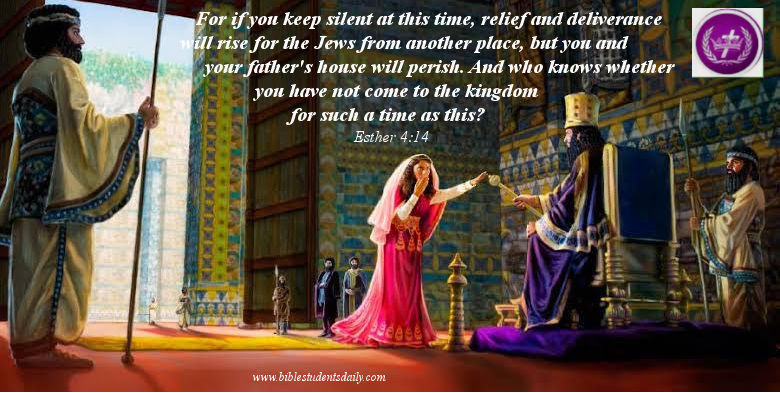
Haman
Esther 3:1 After these things did king Ahasuerus promote Haman the son of Hammedatha the Agagite, and advanced him, and set his seat above all the princes that were with him.
Haman was an Agagite. It is not clear whether he was related to “Agag … of the Amalekites” of 1 Samuel 15:8, Haman was from Persia, and the Amalekites from the distant southwest. But the name association reminds us that both were enemies of Israel. The name reminds us also of the term “Gog” of Ezekiel 38:2, the enemy from the north that will attack Israel at the introduction of the kingdom. Haman is a picture of Satan, the enemy of God. Satan knows that the Kingdom is to begin at Israel. Thus, if he can destroy Israel, he could thwart the plan of God.
Gog and Magog are mentioned again in the rebellion in the Little Season at the end of the Millennium (Revelation 20:7-9). Satan will then also seek to thwart the success of the kingdom, by stirring up rebellion against it. However, the narrative respecting Haman in the Book of Esther, is about Satan efforts at the beginning of the kingdom.
Ezekiel 39:11-16 even reflects the name Haman — in this case as Hamon — for Hamon-gog is the cemetery for the forces of Gog defeated by God, and Hamonah is the name of the city where the cemetery is located.
Esther 3:2 And all the king’s servants, that were in the king’s gate, bowed, and reverenced Haman: for the king had so commanded concerning him. But Mordecai bowed not, nor did him reverence.
When Haman entered or exited the gate leading to the inner court of the king’s palace in Shushan, the people gave deference to him because of his status.
In Haman’s animosity toward Mordecai, Haman wished to get rid of all the Israelites. Also, an anti-Semitic feeling may have risen earlier in the Persian Empire. When Daniel and his three Hebrew companions were elevated, their religion marked them for persecution. Daniel had been cast into a den of lions, and his three friends were thrown into a fiery furnace. The fact that four Jews had received top positions in the Empire may have provoked other princes to envy.
Today anti-Semitism continues because the Jewish race has been an accomplished over the centuries. Despite the persecutions (or perhaps because of them), and through the principles of the Law of Moses, Israelites have prospered. They have done well in business, and percentage- wise, a majority of the Nobel prize winners have been Jewish.
Esther 3:8 And Haman said unto king Ahasuerus, There is a certain people scattered abroad and dispersed among the people in all the provinces of thy kingdom; and their laws are diverse from all people; neither keep they the king’s laws: therefore it is not for the king’s profit to suffer them.
Esther 3:9 If it please the king, let it be written that they may be destroyed: and I will pay ten thousand talents of silver to the hands of those that have the charge of the business, to bring it into the king’s treasuries.
Haman even had a large sum of money in reserve (10,000 talents of silver) to pay those who would be in charge of expunging Israelites from the Persian Empire.
Esther 3:10-11 And the king took his ring from his hand, and gave it unto Haman the son of Hammedatha the Agagite, the Jews’ enemy. (11) And the king said unto Haman, The silver is given to thee, the people also, to do with them as it seemeth good to thee.
The king in effect said to Haman, “I have confidence in you and in your advice that the eradication of these people who have diverse laws and customs will promote the welfare of the kingdom.” The king gave his ring to Haman, as authority to proceed. The adversary also plans for his evil purposes (2 Corinthians 4:4, John 8:44).
Haman’s wife and friends suggested that he build gallows of 50 cubits on which to hang Mordecai. Haman was wealthy, and he proceeded. Of course Satan was operating behind the scene. Haman’s motive for such a high gallows was to make the hanging known. Similarly, Jesus was crucified on Calvary, the highest location nearby, to make him a public example. Those in Jerusalem could see him above the city walls. The site also was overruled by God, as conducive to recording the Crucifixion in history.
The Decree
The decree was sent out from Shushan, the capital, with all urgency, “hastened by the king’s commandment.” “And the king and Haman sat down to drink; but the city Shushan was perplexed.”
When Mordecai heard about the decree, “he rent his clothes, and put on sackcloth with ashes, and went out into the midst of the city, and cried with a loud and a bitter cry”(Esther 4:1). This reminds us of Proverbs 29:2, “When the righteous are in authority, the people rejoice: but when the wicked beareth rule, the people mourn.” Imagine hearing the news that all were to be put to death: men, women, and children. We can see why the people were ready to fast subsequently.
Through one of the king’s chamberlains, Hatach, Mordecai sent Esther a copy of the decree (Esther 4:5), and advised her, as queen, to go to the king and make supplication for her people. This was risky. If Esther sought an audience with the king and he did not hold out his scepter in agreement, she would be put to death. But Mordecai, in faith, recognized that Esther had become queen for this occasion, to deliver their people.
Esther 4:13 Then Mordecai told them to reply to Esther, “Do not think to yourself that in the King’s palace you will escape any more than all the other Jews. (14) For if you keep silent at this time, relief and deliverance will rise for the Jews from another place, but you and your father’s house will perish. And who knows whether you have not come to the kingdom for such a time as this?”
God’s Divine Providence
“The Lord preserveth all them that love him” (Psalm 145:20). All who can affirm in their hearts their loyalty to God, their faith and trust in Him, may be assured that all things are supervised for their good and work out for their welfare, in matters both temporal and eternal.
God is not directly mentioned in the Book of Esther. This absence is actually part of the book’s sophisticated way of talking about God’s providence. God is always at work, even when we cannot see that work explicitly. God’s providence works in everything to save and deliver his people.
Esther 4:15 (15)Then Esther told them to reply to Mordecai, (16) “Go, gather all the Jews to be found in Susa, and hold a fast on my behalf, and do not eat or drink for three days, night or day. I and my young women will also fast as you do. Then I will go to the king, though it is against the law, and if I perish, I perish.”
Esther heeded Mordecai’s advice. She saw the appropriateness of fasting and having others fast because of the seriousness of the situation. The Jews in Shushan had already been fasting in sackcloth, but now the fasting and praying would be particularly for Esther, who needed the prayers of her Jewish brethren.
Notice that everything in this chapter reflects providential timing. The king could have been elsewhere, but he was sitting on his throne. And out in the inner court, Esther was directly opposite his seated position on the throne when she came into his view.
Esther 5:2 “When the king saw Queen Esther standing in the court, she won favor in his sight, and he held out to Esther the golden scepter that was in his hand. Then Esther approached and touched the tip of the scepter.”
When the king saw Esther, she obtained his favor. Touching the top of his scepter was an ancient custom. The scepter is a symbol of kingly authority, as in “the sceptre shall not depart from Judah, nor a lawgiver from between his feet, until Shiloh come; and unto him shall the gathering of the people be” (Genesis 49:10). Thus the scepter, or the rod, was significant. When Moses lifted his rod his symbol of authority, the Red Sea parted (Exodus 14:15,16). Psalm 45:6 reads, “Thy throne, O God, is for ever and ever: the sceptre of thy kingdom is a right sceptre.” As the scepter is a symbol of justice here, Esther touching the king’s scepter suggests that she was asking for justice.
Esther’s reply to Mordecai shows “a beautiful lesson of faith here that should appeal to all of the Spiritual Israelites. Whatever we have, whatever positions we occupy of influence, or power, or wealth or confidence in the esteem of others, is so much of a stewardship granted to us by the Lord, and respecting which we should expect to give an account. And if the account would be rendered with joy, we must be faithful even to the risking of our lives in the interests of the Lord’s people, the Lord’s cause. Let us lay this feature of Esther’s experience to heart, that we may draw valuable lessons therefrom, helpful to us in the spiritual way. The suggestion that she had not come to a place of honor and privilege by accident, but that the Lord had overruled in the matter, is one that should appeal to all Israelites indeed. Whatever we have is of the Lord’s providence. Let us use it faithfully, and as wisely as possible, for him and his. Thus our own blessings and joys will be increased as well as our favor with the Lord” (Reprints, page 3657). When Esther entered the king’s presence unbidden, she was reconciled to death. But what a sudden change occurred! One moment she feared for her life, the next she was offered half the world! How quickly God can change our prospects! The things we fear most, often turn out to be great blessings. “Ye fearful saints, fresh courage take; the clouds ye so much dread, are big with mercy, and shall break in blessings on your head.”
Let us consider two seeming coincidences in the account. On the same night in which Haman built his high gallows, the king could not sleep. He called for the royal record book and was reminded that Mordecai had saved his life. When Haman entered the outer court of the king to ask permission to hang Mordecai, the king had decided to honor Mordecai. He asked Haman what should be done to “the man whom the king delighted to honor?” Were these events were merely coincidental? We know they were not! This was the finger of God. We have the very same supervision of our affairs. Our heavenly Father can control and maneuver every principality and power with the greatest of ease for our benefit. To a child of God, nothing happens by accident. Every event of life is supervised for one’s highest welfare. What comfort and assurance this should give our hearts!
Boldness, Bravery, Faith, Prayer, and Humility
Esther 4:15: “Then I will go to the king and if I perish I perish.”
Another lesson from Esther’s story is her courage to risk her life. God uses people who are willing to take risks. When we are called to step out in faith, let us realize that our Heavenly Father is greater than any problem. “Be still and know that I am God” (Psalms 46:10, 2 Timothy 1:7). “God gave us a spirit not of fear, but of power and love and self control” (John 14:27). “Peace I give you.. Do not let your hearts be troubled.” No risk, no reward! 1 Chronicles 28:20, “Then David said to Solomon his son, ‘Be strong and courageous and do it. Do not be afraid and do not be dismayed, for the Lord God, even my God, is with you. He will not leave you or forsake you, until all the work for the service of the house of the Lord is finished.’”
Judges 6:15, “He said to him, Please, Lord, how can I save Israel? Behold, my clan is the weakest in Manasseh, and I am the least in my father’s house.” Doing nothing does not change your current situation. Do not live with the regret that you did not go forward.

There is a quote that says, “if God brings you to it, He will bring you through it.” Proverbs 29:25, “The fear of man lays a snare, but whoever trusts in the Lord is safe.” Esther took a bold move and was willing to risk her life in order to act and speak on behalf of her people. We must depend on God fully and remember that when we are weak, we are strong. 2 Corinthians 12:9, “My grace is sufficient for you, for my power is made perfect in weakness.” God wants to get the glory out of our lives which means stepping out in faith. This causes us to grow in so many ways and trust him more.
Isaiah 58:6, “Is not this the fast that I choose: to loose the bonds of wickedness, to undo the straps of the yoke, to let the oppressed go free, and to break every yoke?
Fasting and prayer should become our lifestyle, as Esther fasted and prayed with her people. Do you need God’s intervention in your life? Perhaps God is using you to help someone who is oppressed. As the Jews needed the chains and plans of the enemy to break that they may be set free, the answer to having it so is through prayer. In the time of trouble and threat Esther knew and understood the power of prayer and fasting. She was about go into the King’s presence without being called. She knew that she needed God’s intervention in this crucial time.
Philippians 4:6–7, “(6) Do not be anxious about anything, but in everything by prayer and supplication with thanksgiving let your requests be made known to God. (7) And the peace of God, which surpasses all understanding, will guard your hearts and your minds in Christ Jesus.”
Though Esther became queen, she used her position to bless her people and country. She remained humble and put the needs of others before her own, recognizing her dependence on God. When we are humble, we can more easily see the needs of those around us and be better equipped to serve them.
The King’s Dream
Esther 6:2 And it was found written, that Mordecai had told of Bigthana and Teresh, two of the King’s chamberlains, the keepers of the door, who sought to lay hand on the king Ahasuerus.
Stirring up the king’s spirit by the Lord through a dream reminds us of the account of Joseph, in which the king, the butler, and the baker all had dreams (Genesis 40:5-8; 41:1-8). Of King Nebuchadnezzar, who dreamed of a great image (Daniel 2:1). Of Pilate’s wife during the trial of Jesus (Matthew 27:19). All of these dreams were directed by Divine Providence.
When King Xerxes awoke from his dream, he was so disturbed that he ordered his servants to bring the chronicle records and read them that very night. The dream must have been powerful to demand such attention in the middle of the night. The king could not go back to sleep until he had heard the records.
Esther 6:3 And the king said, “What honor or distinction has been bestowed on Mordecai for this?” The king’s young men who attended him said, “Nothing has been done for him.” (4) And the king said, “Who is in the court?” Now Haman had just entered the outer court of the king’s palace to speak to the king about having Mordecai hanged on the gallows that he had prepared for him. (5) And the king’s young men told him, “Haman is there, standing in the court.” And the king said, “Let him come in.”
Notice the crucial timing. At the very time the king inquired what honor had been given to Mordecai for warning the king, Haman came into the king’s court to inquire of destroying Mordecai. Mordecai was the center of thought for both, but for opposite reasons — one for Mordecai, and one against him. What split-second timing!
Haman wanted to speak about hanging Mordecai, but the king spoke first: “What shall be done unto the man whom the king delighteth to honour?” Haman assumed the king wanted to honor him. Of course Satan was in back of Haman, and God was in back of the king. Haman suggested multiple ways of showing honor: “let [1] royal robes be brought, which the king has worn, and [2] the horse that the king has ridden, and [3] on whose head a royal crown is set.” How presumptuous Haman was to ask for the royal crown! Jesus never meditated a usurpation. But another high angel, Lucifer, did.
The king’s words to Haman were very significant: “Leave out nothing that you have mentioned.” The honor bestowed fits the antitype. The Ancient Worthies, mostly Jews, will be elevated and honored. Mordecai had instructed Esther not to disclose her identity, but now it was an honor to be an Israelite. Imagine the expression on Mordecai’s face when he learned that such honor would be his. He had asked the Israelites to pray and fast to avoid death — now he was elevated to a high position in the empire.
Esther 7:1 So the king and Haman went in to feast with Queen Esther. (2) And on the second day, as they were drinking wine after the feast, the king again said to Esther, “What is your wish, Queen Esther? It shall be granted you. And what is your request? Even to the half of my kingdom, it shall be fulfilled.” (3) Then Queen Esther answered, “If I have found favor in your sight, O king, and if it please the king, let my life be granted me for my wish, and my people for my request. (4) For we have been sold, I and my people, to be destroyed, to be killed, and to be annihilated. If we had been sold merely as slaves, men and women, I would have been silent, for our affliction is not to be compared with the loss to the king.”
When Haman was called to eat at Esther’s banquet, he was already upset. It was now that Esther revealed she was Jewish. Esther reminded the king of the nature of the decree. However, Ahasuerus did not immediately grasp the situation, though earlier he had agreed to the decree that went through the empire, that the Jews were to be slain. He listened attentively to Esther’s request, but he had not put things together.
Esther 7:5 Then King Ahasuerus said to Queen Esther, “Who is he, and where is he, who has dared to do this?” (6) And Esther said, “A foe and enemy! This wicked Haman!” Then Haman was terrified before the king and the queen.
Haman’s wife and friends had surmised that his future was ominous, but before Haman could think on their words, the king’s emissaries hastened him to Esther’s banquet. Esther spoke bluntly: “The adversary and enemy is this wicked Haman.” In other words, “The wicked person is right here before you.” Imagine Haman’s countenance!
When the king heard what Haman had done, in a fit of anger he went into the palace garden to ponder the situation. The king himself had elevated Haman. What would he do now?
Esther was on a couch, or a cushioned lounge. In desperate straits, Haman got on his knees before Esther and put his hand on her. He draped himself over her to beg for his life. Again the timing was perfect. The king returned, and misjudged Haman’s intent, declared again him. Harbonah, one of the king’s chamberlains, suggested hanging Haman on his own gallows.
This segment of Esther — the account about Haman and Mordecai — illustrates the contest between the authority of God, and the efforts of Satan. It is a picture of Gog’s attack on Israel at the end of the Gospel Age, introducing the Kingdom. In Ezekiel 38 Gog is drawn to Israel to destroy them. Instead, the forces of Gog will themselves be overcome. The cemetery, Hamon- gog, connects symbolically to the gallows in Esther.
Following the Millennium Satan will advance again against the Kingdom of God. He will gather those in sympathy with his thinking, against the authority of the Ancient Worthies. Haman, Satan, will again be upstaged. This time he will not be bound, but done away forever.
The Kingdom will then be the domain of mankind forever. Those who pass through the Little Season — perfect, tried, and proven faithful — will reign as kings over earth, as offered to Adam at the beginning. They will live forever in the ages to come. Gladness and Rejoicing
Esther 8:16 The Jews had light, and gladness, and joy, and honour.
This verse describes how the Jews will be regarded in the Kingdom. They will have “light, and gladness, and joy, and honour.” There will be a “feast of fat things” (Isaiah 25:6).
Esther 8:17 And in every province and in every city, wherever the king’s command and his edict reached, there was gladness and joy among the Jews, a feast and a holiday. And many from the peoples of the country declared themselves Jews, for fear of the Jews had fallen on them.
The Gentiles will accept the God of Israel, and the principles of God’s covenant, “proselyting” to faith in God. They will bow the knee, receive the hopes of Israel, enter into the New Covenant God establishes with Israel, and so be blessed. They will “take hold of the skirt of him that is a Jew” (Zechariah 8:23), and be blessed.
There will be “gladness and joy” when the great king has selected his bride and the heavenly wedding takes place. “Let us be glad and rejoice, and give honor to him; for the marriage of the Lamb is come, and his wife hath made herself ready” (Revelation 19:7).
After Esther was crowned there was great rejoicing by all the people of the kingdom, and “the king made a great feast.” “On this mountain the Lord Almighty will prepare a feast of rich food for all peoples, a banquet of aged wine — the best of meats and the finest of wines” (Isaiah 25:6). Thus, the whole world will beast on the rich blessings of the Millennial Kingdom.
References:
- Br. Frank Shallieu, Old Testament Studies – The Book of Esther, 1996 Study
- Queen Esther, Beauties of the Truth, Volume 25, Number 3, August 2014
- Br. Donald Holliday, Esther and Our Times – The Herald of Christ’s Kingdom 1999 – Sept-Oct
This post’s URL is : https://biblestudentsdaily.com/2022/12/27/the-deliverance-of-esthers-people/






